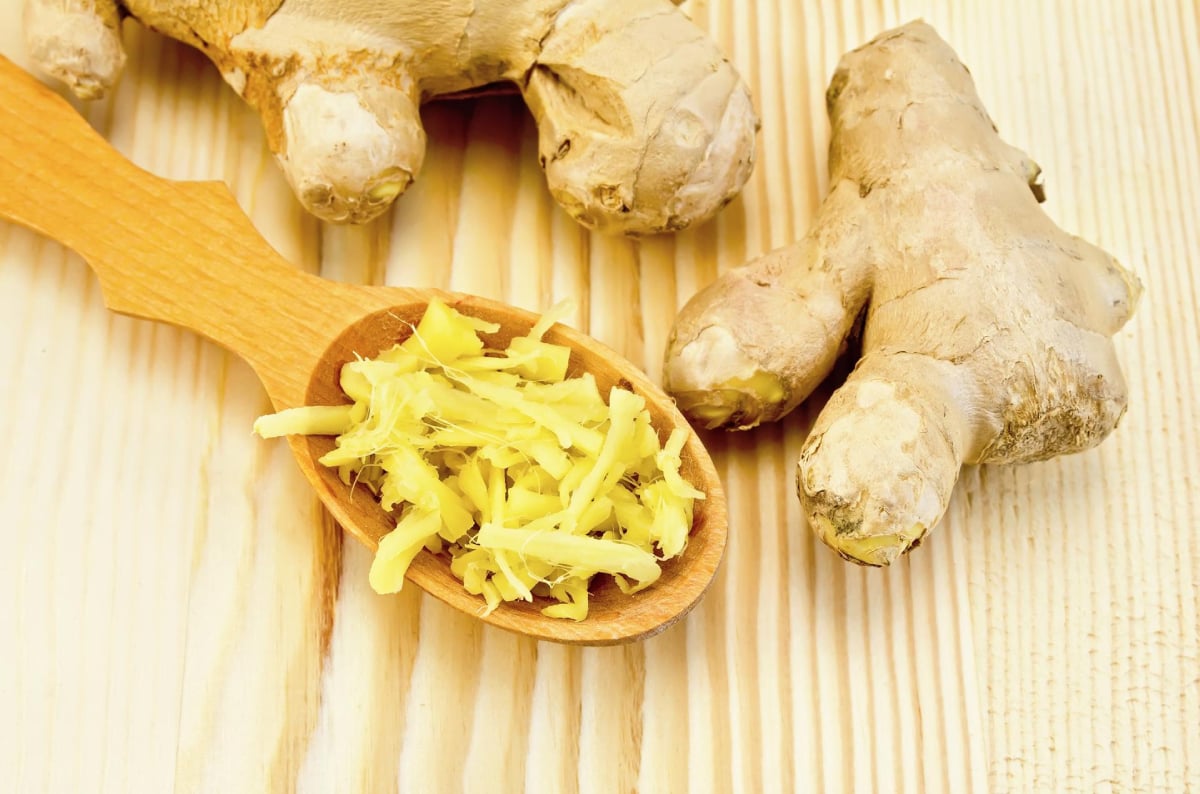Many factors can contribute to bloating (too much gas in the intestines). It is often a sign that the digestive tract is not working properly. Gas can build up due to bacterial overgrowth in the intestines, poor absorption of carbohydrates, or functional digestive disorders such as irritable bowel syndrome (IBS).
Additionally, bloating can be caused by poor digestion, constipation, weight gain (excess visceral fat can reduce abdominal volume and disrupt digestion), hormonal fluctuations, etc. If you are concerned about the root cause of chronic bloating, it is best to see a doctor.

There are many causes of bloating…
1. Some spices help reduce bloating
- Ginger: Ginger has anti-inflammatory, antioxidant and anti-ulcer properties... and is a medicine that has been used by people for a long time. Research has shown that ginger can improve stomach motility, reduce intestinal spasms, reduce bloating and flatulence. In addition, ginger also helps reduce nausea and vomiting.
- Fennel seeds: Fennel seeds have many benefits in supporting intestinal health and improving bloating. Fennel seeds contain antispasmodic and anethole, which supports healthy intestinal muscle contractions. Fennel seeds have a slightly sweet taste and are often used as a spice. Many people soak fennel seeds in hot water and drink it to aid digestion after meals.
- Black pepper: Black pepper is one of the spices available in the kitchen, used in the preparation of many dishes. But not only that, piperine, a compound in black pepper has been shown to improve digestion and increase nutrient absorption.
Compounds in black pepper help increase blood flow to the digestive tract and help stimulate the release of digestive enzymes needed to digest food. Better digestion means less bloating.
- Cinnamon: Cinnamon is one of the most widely used spices in the world . Research has shown that cinnamon can help with a variety of conditions and symptoms, including nausea, bloating, coughs, colds, loss of appetite, and fatigue. Cinnamon can help promote blood flow, support healthy digestion, and reduce bloating.
- Coriander seeds: Coriander seeds are an aromatic spice that adds a rich flavor to various dishes. However, they also provide many health benefits including aiding digestion. When added to dishes, coriander can help speed up the digestive process.
Coriander also has antibacterial properties, which can help support a healthy gut microbiome; it also contributes to antioxidant activities, helping the body eliminate free radicals and reduce inflammation.
- Green cardamom: Green cardamom is a spice commonly used in dishes such as curries; it can be found whole, peeled, or ground into a fine powder.
Cardamom has antibacterial, antioxidant, anti-inflammatory and diuretic properties. It has been used to treat various health conditions such as indigestion, bloating after meals and because it is a diuretic, it can help eliminate excess fluid (which can cause a feeling of bloating), helping to reduce bloating.

Ginger can help reduce bloating.
2. How to use spices to treat bloating
There are a number of ways to incorporate spices into your daily routine, but the best method depends on the type of spice being used. To use spices to treat bloating, consider:
- Steep them to drink as hot tea.
- Add spices to smoothies
- Cook curry
- Add spices to salad
- Add to salad dressing…
3. Spices that can cause bloating
- Garlic: Some people may be intolerant to this spice. Garlic contains fructans, a soluble fiber that is difficult to digest and can cause or contribute to bloating. People who are allergic to garlic may experience more severe symptoms.
- Onions: Like garlic, onions contain fructans which can cause bloating. When fructans ferment, they draw more water into the intestines, causing significant indigestion in the form of bloating and diarrhea.
- Chili peppers: Capsaicin is the main ingredient in chili peppers, which has been linked to digestive symptoms. While the spice can increase feelings of fullness during meals, it can also cause pain, a burning sensation, nausea, and bloating.
Therefore, when suffering from bloating, you should avoid these spices.
4. Other ways to reduce bloating
In addition to making dietary changes, there are other habits you can practice to help prevent bloating. To help gas move through your digestive system, consider incorporating these behaviors into your lifestyle:
- Eat slowly during meals and chew your food thoroughly.
- Try to eat small, frequent meals.
- Sit upright while eating and for at least 30 minutes after meals.
- Drink beverages at room temperature.
- Take a walk after meals.
Occasional excess gas (bloating) is normal. However, if the condition persists or over-the-counter (OTC) treatments and dietary changes don't work, see your doctor to find out the cause and get appropriate treatment.
Source





























![[Photo] National Assembly Chairman Tran Thanh Man visits Vietnamese Heroic Mother Ta Thi Tran](https://vphoto.vietnam.vn/thumb/1200x675/vietnam/resource/IMAGE/2025/7/20/765c0bd057dd44ad83ab89fe0255b783)






































































Comment (0)